The ACM Student Research Competition is an internationally recognized contest where undergraduate and graduate students present their original research. Our committee selected 22 students to participate in this competition at this year’s Grace Hopper Celebration Poster Session. A panel of judges selected three undergraduate students and three graduate students as the winners, all of whom received a cash prize for their incredible work. The top undergraduate student and top graduate student will also advance to the Grand Finals.
Learn all about the six winners and their research:
Undergraduate Winners
1st Place – Stephanie Mason, Western Washington University
Poster Title: Characterizing Rigidity Properties of Protein Cavities through Data Visualization
Stephanie used a computational approach to investigate various aspects of protein structure. She combined features of a physical aspect of protein structure — their cavities — with a computational output called rigidity analysis. « Both cavities and rigid properties are of interest due to their importance in protein function, » Stephanie explained. « I found there are indeed some interesting relationships, but this work is ongoing and we have yet to tease apart what the specifics of those relationships are and whether or not they are biologically meaningful. »
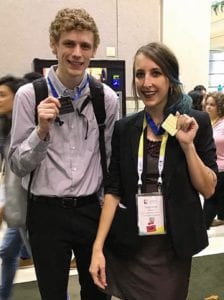 Stephanie was thrilled to present her poster at the 2017 Grace Hopper Celebration (GHC 17). « I found it to be surreal that there were so many people — most of them women, and all of them necessarily talented, intelligent, and interested in tech — attending GHC, » Stephanie said.
Stephanie was thrilled to present her poster at the 2017 Grace Hopper Celebration (GHC 17). « I found it to be surreal that there were so many people — most of them women, and all of them necessarily talented, intelligent, and interested in tech — attending GHC, » Stephanie said.
2nd Place – Theodore Weber, Western Washington University
Poster Title: MyQuitPal – A Participant-Centric Smoking Cessation System
Smoking is one of society’s most challenging behavioral health problems, and current treatment options rely heavily on self-reported data and are prone to recall bias. Leveraging advancements in mobile and wearable technology, Theodore proposed a participant-centric smoking cessation system: MyQuitPal. MyQuitPal objectively identifies factors contributing to lapse, visualizes smoking behavior, and notifies users when they are susceptible to lapse, all in near real-time.
« I’m grateful that I had the opportunity to share my work with so many people at GHC, » Theodore told us. « It reassured me that my research is significant and worth continuing. »
3rd Place – Zalika Dixon, Capitol Technology University
Poster Title: Climate Control: Measurement of Ultraviolet Radiation
 Zalika’s project aimed at increasing public awareness of the effects of climate change in relation to Ultraviolet (UV) radiation. She observed daily UV radiation by using a portable UV datalogger designed from an Arduino board, SD card reader attachment, and five-volt battery pack. She collected and logged UV data over a period of 10 days. She plans to expand this project by creating a mobile campus UV alert system, which will broadcast prevention alerts based on a day’s UV intensity.
Zalika’s project aimed at increasing public awareness of the effects of climate change in relation to Ultraviolet (UV) radiation. She observed daily UV radiation by using a portable UV datalogger designed from an Arduino board, SD card reader attachment, and five-volt battery pack. She collected and logged UV data over a period of 10 days. She plans to expand this project by creating a mobile campus UV alert system, which will broadcast prevention alerts based on a day’s UV intensity.
« Being an ACM Student Research Competition winner told me that this is just the beginning of what I can achieve, » Zalika said.
Graduate Winners
1st Place – Parishad Karimi, WINLAB, Rutgers, The State University of New Jersey
Poster Title: SMART: A Distributed Architecture for Dynamic Spectrum Management
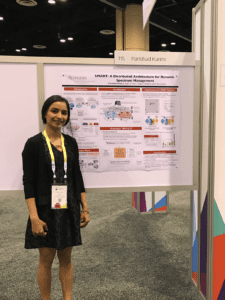 Exponential growth of wireless devices and bandwidth requirements motivate more aggressive utilization of the spectrum by deploying various wireless networks within the same frequency band. Due to their incompatibility, these technologies are incapable to fairly coexist. To solve this problem, Parishad proposed « SMART, » a distributed resource management architecture that enables coordinated resource usage. « Through LTE-WiFi experimental results, » Parishad explained, « we show the gains of inter-network cooperation enabled by SMART. »
Exponential growth of wireless devices and bandwidth requirements motivate more aggressive utilization of the spectrum by deploying various wireless networks within the same frequency band. Due to their incompatibility, these technologies are incapable to fairly coexist. To solve this problem, Parishad proposed « SMART, » a distributed resource management architecture that enables coordinated resource usage. « Through LTE-WiFi experimental results, » Parishad explained, « we show the gains of inter-network cooperation enabled by SMART. »
For Parishad, participating in the competition was a very useful experience, and recommends other students to do the same. « I think ACM SRC is a great platform to get your research exposed to professionals from academia and industry, receive tons of constructive feedback, and feel a sense of validation of your day-and-night research endeavors! »
2nd Place – Aastha Nigam, University of Notre Dame
Poster Title: Harvesting Social Signals to Inform Peace Processes Implementation and Monitoring
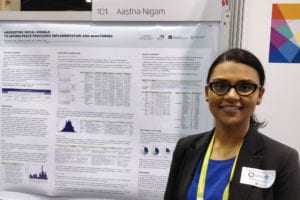 Peace processes are complex, protracted, and contentious. They involve significant bargaining and compromise among various societal and political stakeholders. Like most socio-political events in today’s contemporary society, their outcome is susceptible to volatility and uncertainty. To understand and explain the progression and execution of peace processes, Aastha presented a study to harvest social media signals.
Peace processes are complex, protracted, and contentious. They involve significant bargaining and compromise among various societal and political stakeholders. Like most socio-political events in today’s contemporary society, their outcome is susceptible to volatility and uncertainty. To understand and explain the progression and execution of peace processes, Aastha presented a study to harvest social media signals.
« It was a wonderful experience to not only present research at this massive platform but also obtain direct feedback from experts with diverse backgrounds, » Aastha said of the competition. « Such experiences not only help in growing as a graduate student but also aid in understanding the relevance, applicability, and reach of our work. »
3rd Place – Mariam Nouh, University of Oxford
Poster Title: CCINT: Cyber-Crime INTelligence Framework for Detecting Online Radical Content
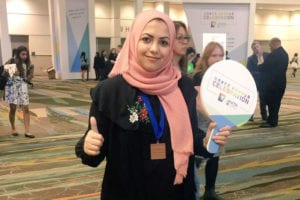 Recently, several criminal and radical groups have adopted online social networks as a medium of operation. This allows them to broadcast propaganda material aiming to spread fear, and radicalize and recruit potential members. Mariam studied the characteristics of existing online radical groups and defined automated approaches to detect them. She was able to analyze the content they posted, as well as their behavior, using natural language processing and machine learning techniques.
Recently, several criminal and radical groups have adopted online social networks as a medium of operation. This allows them to broadcast propaganda material aiming to spread fear, and radicalize and recruit potential members. Mariam studied the characteristics of existing online radical groups and defined automated approaches to detect them. She was able to analyze the content they posted, as well as their behavior, using natural language processing and machine learning techniques.
« Attending GHC was an extremely fascinating and inspiring experience that made me feel energized and empowered, » Mariam said.
Congratulations to all six winners, and good luck to Stephanie and Parishad at the Grand Finals!











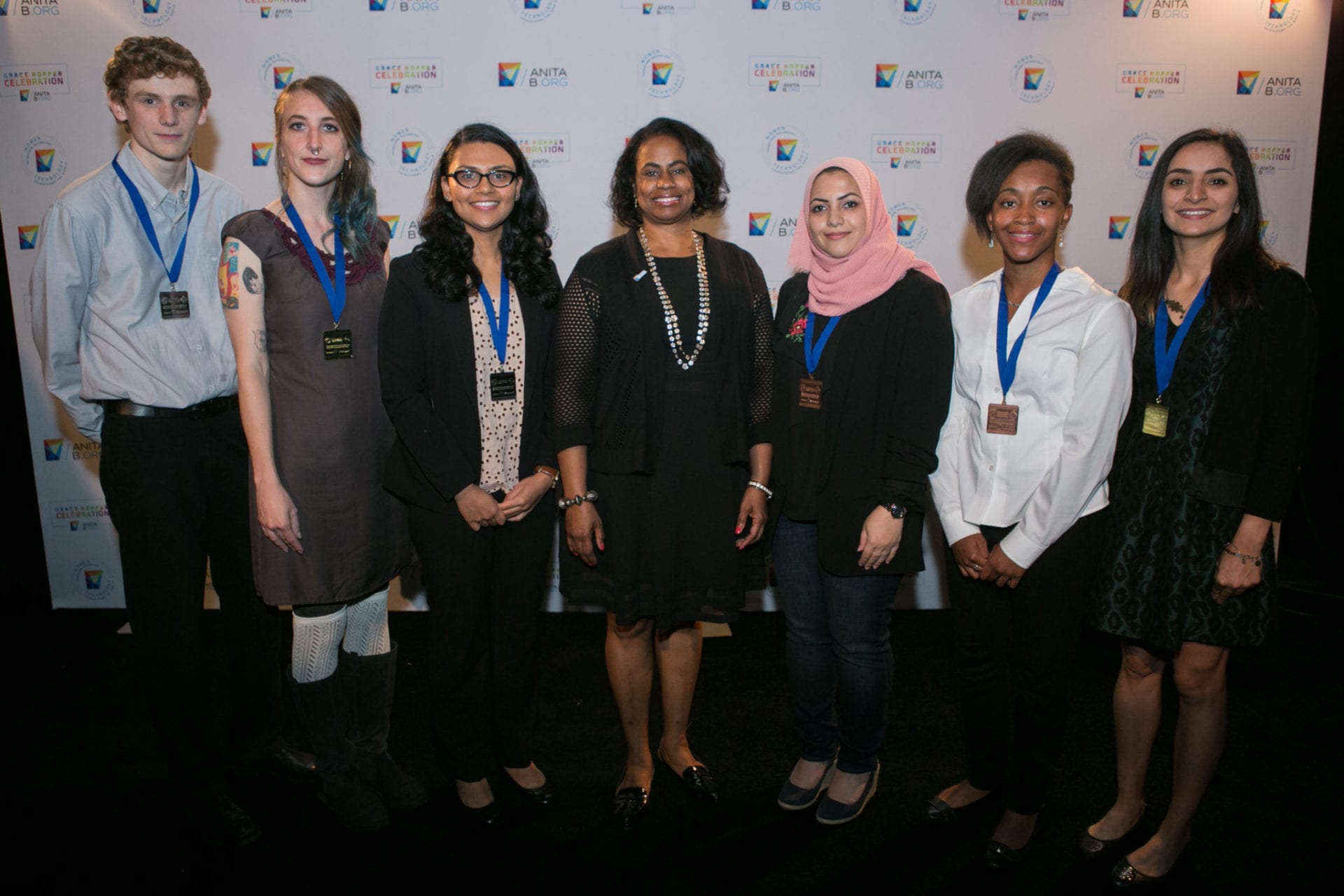
Laisser un commentaire
Vous devez vous connecter pour publier un commentaire.